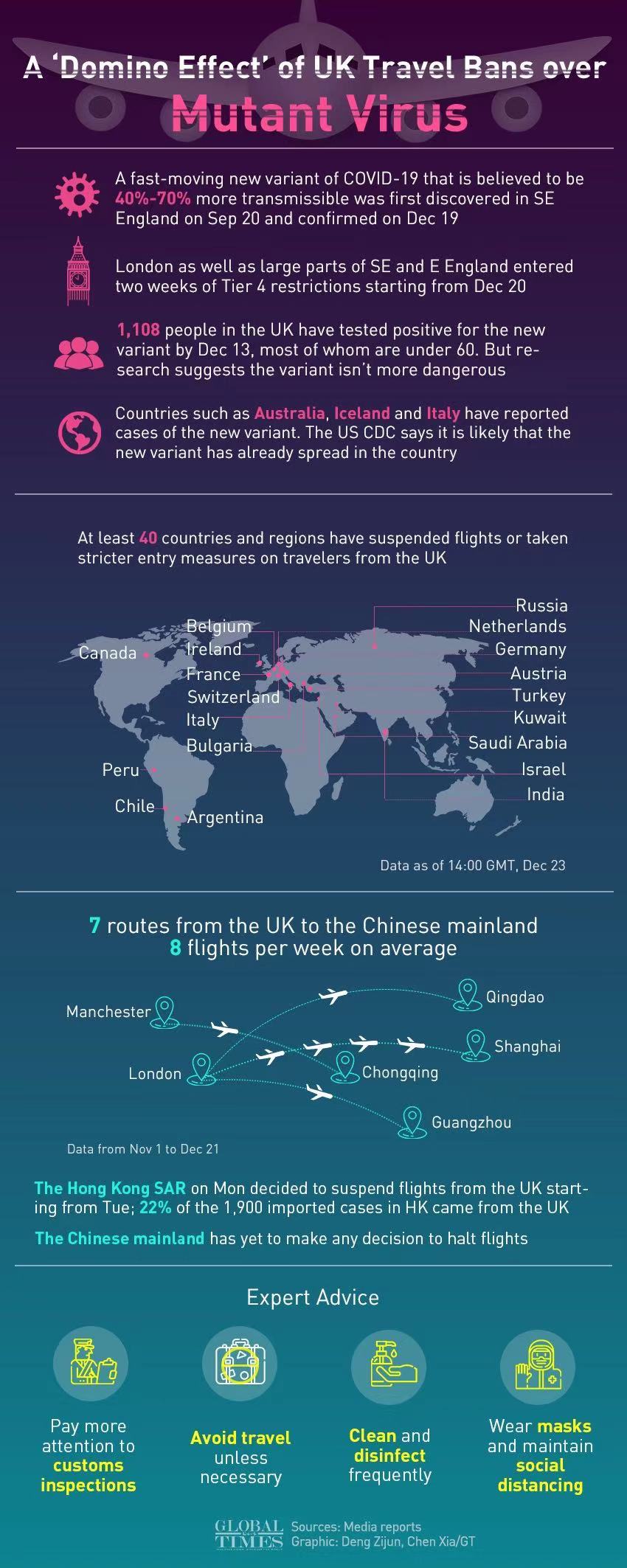
Countries such as Australia, Iceland and Italy have reported cases of people infected by the new COVID-19 variant confirmed in the UK. At least 40 countries have suspended flights or taken stricter entry measures to curb the spread of the more transmissible variant. Graphic: Deng Zijun, Chen Xia/GT
Beijing has become the fourth city in China to report confirmed COVID-19 cases that appear to be the same as the variant initially found in the UK. Experts have called for stronger prevention and control measures to curb the spread of the more transmissible variant in the country.
The Beijing Center for Disease Control and Prevention (CDC) reported on Thursday that the coronavirus strain in the two cases was the variant B.1.1.7 that has been spreading in the UK after conducting complete genome sequencing and analyses of the two samples.
Feng Zijian, a deputy director of the CDC, said at a press conference on Wednesday that the anti-epidemic work has become more difficult as the mutated form of the virus spreads more easily.
As China's national holiday approaches, with a large number of people set to move across the nation, experts have called for stricter prevention and control measures to contain the high risk of the virus spreading.
The most notable feature of the mutated strain reported in the UK is that its transmissibility has indeed increased, which makes it an urgent task to screen and find out the close contacts of the confirmed cases and get the affected areas under control at the earliest stage, said Wang Peiyu, a deputy head of Peking University's School of Public Health.
But Wang also noted that the current studies have shown that mutated viruses won't change the clinical features of the disease or aggravate its severity, and the incubation period doesn't appear to increase.
The treatment plan for patients who are infected with the mutated virus is basically the same as for confirmed cases imported from overseas and confirmed cases in Beijing's other affected area, Shunyi district, Jin Ronghua, principal of Beijing Ditan Hospital where all the COVID-19 patients are receiving treatment, told the media on Thursday.
However, he noted that patients from different epidemic areas or with uncertain epidemiological classification were placed in separate rooms for treatment.
The new variant reported in Beijing was found to be imported from an overseas source based on initial findings, said the Beijing CDC.
Beijing has ordered screening of all the people who entered Beijing from overseas since December 10 after Daxing reported seven new cases on Wednesday and imposed strict restrictions on the whole district.
Beijing is the fourth city after Qingdao in East China's Shandong Province, Guangzhou in South China's Guangdong Province and Shanghai to report cases of the new virus strain.
Shanghai's CDC said on January 1 that the genetic sequencing of COVID-19 in a returning student from the UK is highly similar to that of the variant detected in the UK.
Similarly, on January 3, Guangdong also detected the B.1.1.7 variant in a nucleic acid test sample from a Chinese student who returned from the UK on December 4.
Qingdao on January 5 also reported its first confirmed case of the new coronavirus strain.
Though the more transmissible variant has been found in four places in China, Wang said there won't be a large-scale outbreak caused by the new variant as China's anti-epidemic measures are effective for preventing the sporadic cases from expanding.
Zeng Guang, chief epidemiologist with the Chinese CDC, told the Global Times after China detected its first new variant in Shanghai that such cases of the new variant imported to China are not surprising as the variant has spread to many other countries following its initial detection in the UK, and it is difficult to block the new variant from being imported to China.
